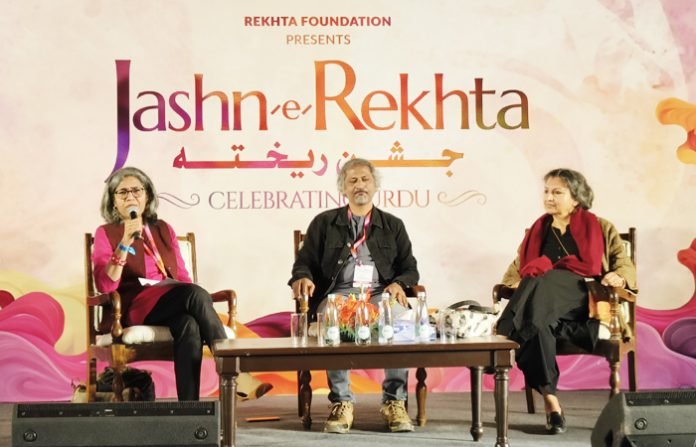
Jashn-e-Rekhta, the festival that celebrates Urdu language and literature, was held at Major Dhyan Chand National Stadium near India Gate in New Delhi from 8 – 10 December 2023. The festival had a session on Urdu and Hindi – Qurbatein aur fassle (Urdu and Hindi – Affinity and distances) that featured Geetanjali Shree, Booker Prize-winning author of Ret Samadhi and Rahman Abbas, Urdu novelist. It was moderated by journalist Seema Chishti.
In 1835, during the colonial rule, Urdu, along with English, became the official language of Northern India. In the late 19th Century, efforts were made by pro-Hindi movements to displace Urdu’s official language status. The rift between proponents of the two languages began and became part of the identity politics in British India in the events leading to the partition of India. Today, while English and Hindi are the official languages of the country, each state or union territory has been given the freedom to choose its official regional language.
Saadat Hasan Manto shared in his popular story Hindi aur Urdu, “Why are Hindus wasting their time supporting Hindi, and why are Muslims so beside themselves over the preservation of Urdu? A language is not made, it makes itself. And no amount of human effort can ever kill a language.”
Abbas explained that the distancing of Hindi and Urdu began during the 19th century and was further fueled by partition. These political events had a direct influence on both languages.
Shree said the idea of India was based on the combination of regional cultures, languages and dialects. Post-independence, Hindi and Urdu got suddenly engulfed in politics and soon became the languages that defined India and Pakistan, respectively. Though a line has emerged between both languages, there are ample opportunities for both to sustain themselves, according to Shree. She gave the example of the North Indian state of Uttar Pradesh where Urdu is spoken widely in Lucknow, Aligarh, Benaras (Varanasi), Ghazipur, and Basti.
According to Abbas, in India, citizens watch Hindi cinema and are expected to talk to each other in Hindi. The government, he said, wants to spread Hindi in all regions at the cost of languages spoken by smaller populations. India has the Ganga-Jamuni tehzeeb in which both languages co-exist together despite differences, and this tehzeeb cannot be destroyed by political might. “In spite of being a democracy, we don’t give equal status to all languages,” he said.
Chishti reminded the audience of the time when Hindi film songs were not played on All India Radio due to the seeming inelegance of Hindi to the Urdu speaking population. She added that in another twist of curtural hegemony, the present government is changing the names of places and roads named after the Mughals.
In a multicultural nation like India, spoken languages and dialects of various regions are composed of elements of smaller languages, Shree said. There is a need to look at languages in a pluralistic frame of mind and consider the beauty of all scripts, whether Arabic, Devanagari, Persian, or Sanskrit. “We should stop looking at languages from a purist nazariya (viewpoint) as there is no one Hindi or one Urdu language, but a variety of dialects that coexist depending on the region.
Puritism has increased in the Urdu language since India’s independence, Abbas said, which leads to a narrowness and is dangerous for the socio-political climate as it leads to an autocratic outlook. For instance, there has been a soft islamization of the Konkani society where the population is forced to speak Hindi or Urdu, rather than bringing their indigenous Konkani flavor, Abbas said.
Shree said languages have become a part of identity politics, which is dangerous for society. We should learn language and culture from each other and beware of identity politics, adding that literature has the power to cross all borders. Shree’s Hindi book Ret Samadhi has been translated into several Indian languages such as Marathi, Malayalam, and Urdu, and into English and other European languages.
Language learning is a slow process, Abbas said and explained that one needs to learn about the words and the inflections of their meanings in various contexts.
After the panel discussion, the writers and members of the audience read extracts of their books in several languages.
















